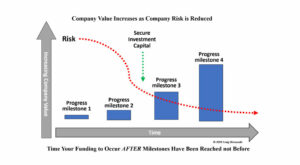Thi s is the first in a series of seven common entrepreneurial mistakes, and how to fix them. Although the context will be biotech entrepreneurs, these principles apply to all entrepreneurs.
s is the first in a series of seven common entrepreneurial mistakes, and how to fix them. Although the context will be biotech entrepreneurs, these principles apply to all entrepreneurs.
One of the most critical mistakes entrepreneurs make, is not clearly defining their goals at the outset, in terms of their business model and product development goals. Investors instinctively know whether an entrepreneur really understands where they are going, or if they are just on a “fishing expedition,” hoping to figure out things—after they get their money. Your business model and product development goal impacts many things.
For example:
- Is your business goal to incrementally advance your technology and increase its value while at staying employed at your academic institution, then to consult for the company that licenses, develops and commercializes your future product?
- Is your business goal to advance your technology all the way through to product commercialization?
- Is your business goal to develop a prototype or reach preclinical stage, then license the project to a Med Device, Pharmaceutical Company or Diagnostic Company?
- Is your business goal to develop an In-Vitro Diagnostic test kit, or are you wanting to reach to the market faster as a Laboratory Developed Test (LDT) as a clinical service model?
Recognize that the choice of a business goal effects the optimal enterprise structure, the amount of capital you need, and the time required to reach an investor exit. Each of which have differing amounts of risk and differing valuations.
Here is an analogy why it is critical to define your goal at the outset. Suppose ten people living in Oklahoma City have a common goal of arriving at New York City by automobile. Each one can choose from dozens of different routes to reach this destination. Some choices will allow an individual to arrive sooner, other choices will cause an individual to arrive later, but all ten individuals will eventually reach the same destination—as long as they constantly head northeast. The moment someone heads south, west, or northwest…they will not arrive at their goal!
This may seem remedial, but it is an important analogy. If your business goal is defined at the outset, you and your team can use their creative ability to overcome obstacles to arrive at your desired destination. However, if your business goal is not clearly defined, often weary entrepreneurs will take the path of least resistance, only to later discover that their past decisions are directing them away from their desired goal.
Recognize the Difference between the Goal and a Method
Starting and building a biotech company or entrepreneurial organization is not prescriptive! Although there are defined concepts and principals to follow, many paths can lead to success. For instance, when raising capital, one entrepreneur will be successful by building their company with non-dilutive capital in the form of grants, donations and crowdfunding. However, if this funding “method” becomes the “goal” for another entrepreneur who cannot raise non-dilutive capital, they waste precious time trying to achieve a “goal” that was simply one of many methods for raising capital. Recognize that there are many methods to reach the same goal.
How to Avoid this Mistake?
Every entrepreneur begins with a product idea from technology they developed or plan to license. During this time, before the company is incorporated or launched, there usually is no overhead cost structures or payroll to maintain. It is during this time that a variety of goals should be examined, tested and defined—prior to starting the organization. This is a time when literally no one is looking at your organization and you can make as many mistakes as you want—and no one even notices. During this time, practice sharing your vision and goal with other seasoned entrepreneurs, then listen to their feedback. Share your goal with others in the industry and see if they get excited about your vision. If you already launched your company and you are struggling, re-examine your business model and product development goals to see if they are truly aligned with an acute market need. Always be sure to reduce your product concept and business goals into understandable terminology so that even your grandmother can understand. If you successfully do this, and people get excited about your goal, you may be on to something.
Can your Goal Change?
Absolutely! In fact, a good number of successful businesses and products are the result of a strategic business change that occurred because of an insurmountable roadblock in the original product idea or market. However, you first need to have a goal defined before you can change it! I’ll share more about this principle in Mistake #6 “Not Knowing When or How to Pivot or Reinvent Your Business Model or Product—missing critical external queues and failing to take advantage of “serendipity.”
Summary
For entrepreneurial success, you must clearly define your business model and product development goals. Well-defined goals provide a destination that team members can get behind and help to overcome obstacles and roadblocks that are encountered along the way. Entrepreneurs must clearly identify their goals at the outset because those who join your team are motivated by your vision, and your goal is the description of your ultimate destination. If you fail to define your goal, like the reply from the Cheshire cat to Alice when she asked him “which road do I take?” he said, “If you don’t know where you are going, any road will take you there!” Be an entrepreneur with clearly defined goals, so others can creatively help you reach your destination.
© 2015 Craig Shimasaki







